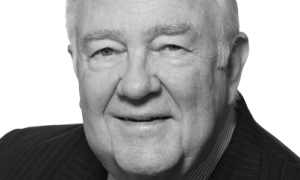Ronald Reagan was a strong believer in personal diplomacy - the idea of having a face-to-face discussion with those he was seeking to persuade. That's why, after becoming president, he often talked privately about the desire to engage the leader of the Soviet Union in a one-on-one conversation, to diminish any fear of the United States' intentions and to seek common ground for reducing tensions and promoting peace.
![]() This was not a new idea for the president. Years before, when he was governor of California, he spoke frequently of his desire to host Soviet leaders on a trip across America, so that he could explain to them the truth about how workers prospered under a free economy.
This was not a new idea for the president. Years before, when he was governor of California, he spoke frequently of his desire to host Soviet leaders on a trip across America, so that he could explain to them the truth about how workers prospered under a free economy.
He also knew the value of direct and frank discussion and was confident of his own negotiating ability. As president of the Screen Actors Guild, he spent countless hours negotiating with the owners of major motion picture studios, hammering out a contract that was fair for both parties. I often heard him say with his typical humor, "After (Warner Bros. Studio head) Jack Warner, the Russians can't be any tougher."
I saw Reagan's negotiating skill firsthand. In 1971, then-Gov. Reagan spent a full week in face-to-face negotiations with the speaker of the California Assembly, the leader of the political opposition. The sessions went on day after day, sometimes lasting late into the night. But the result was the most successful state welfare-reform program in the nation at that time.
So it was understandable that as a newly elected president, Reagan looked forward to meeting his Soviet counterpart. But that day was a long time coming. First, the president wanted to reinvigorate our national defenses, so that he could negotiate with the Communist Party chief from a position of strength. Then, when Reagan was ready to meet, several leaders of the Soviet Union died in succession before a conference could be arranged.
Finally, Mikhail Gorbachev became general secretary of the Communist Party. A younger man than his predecessors, and one who was more familiar with the West, Gorbachev was the ideal counterpart for Reagan's first summit meeting. The date was set for November 1985 in Geneva, Switzerland.
In the days leading up to that momentous occasion, Reagan told me that he hoped that, in addition to the formal sessions of the summit, he could have a private meeting with Gorbachev. He wanted to establish a personal relationship and to break what he viewed as the "barriers of mistrust that divided our countries."
That opportunity came about on the first afternoon of the summit. Reagan suggested to Gorbachev that the two of them go for a walk outside. They strode together to a boathouse near the summit building. They talked there for nearly two hours, alone except for their interpreters. The result was the initiation of a rapport between the two most powerful men on Earth, which developed into a respect - even friendship.
In this conversation, they also agreed to two more summit meetings - one in Washington and one in Moscow - a result that none of the diplomats of either nation would have thought possible. Thus began a series of meetings that changed the course of history.
From a post-Cold War perspective, the main principles of the Reagan program today appear self-evident. Given accurate data about the Communist system, indeed, they are the very essence of common sense. Viewing the rubble of the Berlin Wall, the upheavals that have transformed Eastern Europe, and the internal collapse of the Soviet regime, hardly anyone can doubt that communism was indeed an "evil empire" and a failed economic system.
Yet at the time Reagan was meeting with Gorbachev, there was nothing self-evident about it. On the contrary, he was roundly attacked for both his general analysis of the situation, and for nearly all the specific steps he took in carrying out his policy, from the defense buildup to the Strategic Defense Initiative. Even in the aftermath of the Communist collapse, Reagan's critics were reluctant to credit the accuracy of his vision or the correctness of his policy.
Perhaps the most famous example of this tendency was Time magazine celebrating the virtual end of communism and proclaiming Mikhail Gorbachev "Man of the Decade." Reagan's role in all of this was scarcely mentioned. Margaret Thatcher provided a more accurate view when she famously remarked: "He won the Cold War without firing a shot."
While Ronald Reagan stood firm in his opposition to Communist expansion and imperialism, his personal diplomacy and his relationship with Gorbachev were major factors in shaping the forces that ultimately led to the end of the Cold War - with victory for the cause of freedom.
Meese, a former attorney general in the Reagan administration, is the Ronald Reagan Fellow in Public Policy at The Heritage Foundation (heritage.org). Before joining the Reagan administration, Meese was director of the USD Center for Criminal Justice Policy and Management.
Originally published in San Diego Union Tribune



